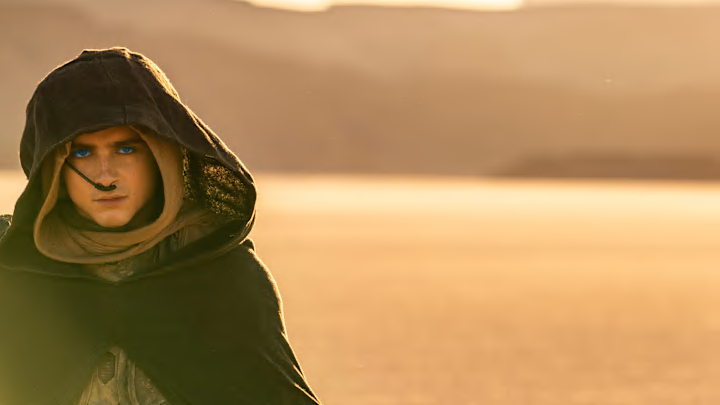If you are a fan of science fiction, chances are you have heard of Dune, the epic story by author Frank Herbert currently being turned into a movie series by director Denis Villenueve. Dune is widely regarded as one of the most influential and important works of science fiction ever written, and has inspired countless other authors, filmmakers, and artists. But where should you start if you want to dive into this rich and complex universe? My answer is simple: start with the first book: Dune, published in 1965.
But not all Dune books are created equal. Herbert wrote six Dune books before his death in 1986, and his son Brian Herbert wrote several sequels and spinoffs after that, working with author Kevin J. Anderson. Fans debate which of the six original books are the best and which are the worst. In this article, I'll share my personal ranking of the original six Dune books by Frank Herbert.
Before that, let's get an idea of the chronology. Here are the six original Dune books in the order in which they were published:
- Dune (1965)
- Dune Messiah (1969)
- Children of Dune (1976)
- God Emperor of Dune (1981)
- Heretics of Dune (1984)
- Chapterhouse: Dune (1985)
With that, let's get into the rankings:
6. Chapterhouse: Dune (1985)

The final book in the series, Chapterhouse: Dune, is also the weakest. It suffers from a lack of focus, a slow pace, and a disappointing ending that leaves many questions unanswered. The book follows the Bene Gesserit — a powerful order of women who use their political acumen and extraordinary abilities to shape the galaxy — as they try to survive attacks from the Honored Matres, a violent faction of former Bene Gesserit who have returned from the Scattering. The book introduces some interesting twists and concepts, such as a new arc for the ghola of Duncan Idaho, the axlotl tanks, and mysterious characters named Daniel and Marty, but it fails to deliver a satisfying conclusion to the saga. Some fans think it is as anti-climactic conclusion to the epic saga of the desert planet Arrakis and its mysterious spice melange.
Before we talk further bout Chapterhouse: Dune, beware that there are SPOILERS AHEAD!
The book picks up where Heretics of Dune left off, with the Bene Gesserit Sisterhood facing multiple threats from the Honored Matres, the violent and hedonistic faction that broke away from them thousands of years ago. Afterwards they joined scattered out into unknown regions of space along with many other peoples following the fall of the God Emperor Leto II, which is covered in the fourth book.
Chapterhouse: Dune follows the adventures of several characters, such as Darwi Odrade, the new Mother Superior of the Bene Gesserit, who tries to find a way to negotiate with the Honored Matres and preserve the ancient wisdom of her order; Duncan Idaho, the ghola (clone) of the original Duncan Idaho, a companion of Paul Atreides in the very first Dune book who holds the key to a mysterious power that could change the fate of humanity (in the first Dune movie, Idaho is played by Jason Momoa); Sheeana, the young girl who can control the sandworms of Arrakis and who some see as a potential messiah; and Miles Teg, the brilliant military commander who is resurrected as a ghola by a faction of genetic scientists known as the Tleilaxu. He discovers he has new abilities.
The book is full of twists and turns, revelations, and surprises, as well as philosophical and religious themes that explore the nature of humanity, free will, evolution, and transcendence. The book also sets up a cliffhanger ending that hints at a possible confrontation with a mysterious enemy that has been manipulating events from behind the scenes. Unfortunately, Frank Herbert died before he could write the seventh book that would have resolved this plotline, leaving fans to speculate and imagine what could have been.
Chapterhouse: Dune is a disappointing book that still deserves to be read by fans of the genre. That it works despite its shortcomings is a testament to Frank Herbert's vision and creativity, as well as his ability to create a rich and complex universe that captivates and challenges the reader. It is also a book that raises important questions about our own society and our place in the cosmos.
As Herbert himself wrote in the introduction: "Think you of the fact that a deaf person cannot hear. Then, what deafness may we not all possess? What senses do we lack that we cannot see and cannot hear another world all around us?"
A lot of fans do not like that Chapterhouse ends on a cliffhanger. I disagree. I will try my best to explain. The six original Dune books cover a period of thousands of years. By the end, a lot of roads has been travelled. There is resolution, but is very open-ended. That open-endedness is a result and consequence of the story that came before. It fits and for me was satisfying. There are unanswered questions but that is the way life is.
Herbert avoids magic and fantasy. Everything he writes is based in science and reality, however much of a stretch he makes. If you want everything answered with a bow tied on it, the ending will not satiate you. But for me not only was there resolution, but I liked the end of the series immensely.
